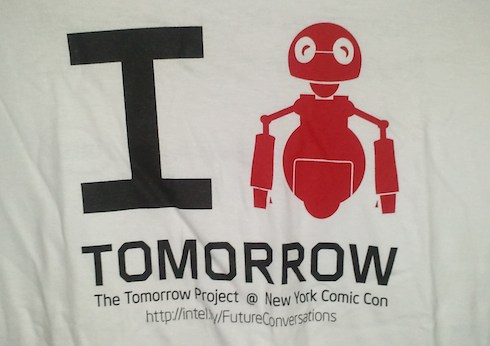How do you feel about tomorrow? It’s a loaded question, especially in a day and age when everyone’s outlook seems to get bleaker by the year. But the only way to create a better future is to talk about it, and in the “Designing the Future” panel at New York Comic Con that’s exactly what Brian David Johnson and Cory Doctorow did.
Brian is an Intel futurist who is responsible for the Tomorrow Project, a brand new endeavor that will use science fiction based on science fact to get people talking about the future. The first anthology is now available, and Cory’s novella in the book is called “Knights of the Rainbow Table.” You’ll love it. I promise. As he so rightly put it, the future is a petri dish: looking at a virus strain under a microscope as it grows is just like building a story, extrapolating possible scenarios to create one version of what might come.
What do you think the future holds?
Brian is hoping that the Tomorrow Project will allow us to talk about the sort of futures that we want and the ones that we don’t. He held up 1984 as a prime example; the phrase “Big Brother” has decidedly bad connotations, and it all came from a novel that was essentially a discourse on surveillance. People who have never even read 1984 know what Big Brother is, and know that it is something they don’t want.
There was a lot of talk about security in the panel, particularly in the discussion of passwords and how bad we are at creating them. It’s the same 8-letter word with a piece of punctuation, one number at the end, and one capital letter at the beginning. Driving the point home, Brian joked that the panel should have been renamed “Cory Doctorow Knows Your Password.” Well, he does, sort of. He also knows that we might be coming up on the end of passwords as a viable means of security, and wonders how we’ll all react to that when the day comes. (Incidentally, if you want a safer password, the recommendation was two words separated by a space. That’s harder to crack.)
But how do we deal with companies who leak passwords, the way Sony recently did? As Cory pointed out, there is no law to govern that scenario. It’s a trust issue between you and the company that holds your information. Who masters the technology is an important question. The thought that any company has the ability to override a computer that you use in your home, or to drive your car, is unbelievable. The control should be yours.
It seems that when the Tomorrow Project began, Brian David Johnson upset quite a few people by starting with a simple question—whose minds did they need to change in order to impact the future? Cory’s answer came from a completely different angle: change our narratives, tell different stories about the future instead.
The audience asked some very interesting questions in the second half of the panel. One person wanted to know what the next big potential crisis was. Facebook style image tagging for the whole internet was one possibility. A de-anonymized internet was another, similar to what happened to Usenet when the content became searchable. And then there was “big data,” the algorithms used to determine things about a person, such as whether or not they would default on a loan. All of those things have potential to blow up in our faces, and soon.
One psych student was concerned for the internet generation, particularly in their difficulty committing things to memory due to their reliance on the internet. Cory wasn’t worried at all. He pointed out that not being able to memorize a slew of phone numbers is insignificant for people: phones did not exist at the dawn of time. Knowing phone numbers is not something that we need to have an innate sense of. He talked about his father, a math teacher, who was never worried about the emergence of the pocket calculator. He suggested that we let human beings do what we are good at doing; computers are great at calculating, but not so great at linking the information they find. Humans are good at comprehending, so that’s what we should set our minds to.
 When the conversation turned back on security, Brian had an interesting piece of information for us; when trying to gauge what sort of information people might give up to a company that gave them access to entertainment, they had individuals categorize it into information they would give up, information they might give up, and information they would never give up. The information people refused to give up had to do with their friends and family, but information they thought they might give up ran the gamut from sexual practices to the zipcode where they lived, and so on. When they tried to figure out what it would take to get someone to move a piece of information from the “might give it up” category to the “would give it up” category, they found that the price was one movie. Just one.
When the conversation turned back on security, Brian had an interesting piece of information for us; when trying to gauge what sort of information people might give up to a company that gave them access to entertainment, they had individuals categorize it into information they would give up, information they might give up, and information they would never give up. The information people refused to give up had to do with their friends and family, but information they thought they might give up ran the gamut from sexual practices to the zipcode where they lived, and so on. When they tried to figure out what it would take to get someone to move a piece of information from the “might give it up” category to the “would give it up” category, they found that the price was one movie. Just one.
One audience member was concerned with overpopulation. The answer there was fairly simple: distribute the wealth. For the most part, people with more money have fewer children. Rich countries are the ones with negative population growth.
And then there was the question of privacy. What Cory Doctorow had to say may be disturbing to some, but it doesn’t make it any less true—there is no privacy bargain. As he said, “We’re in a shooting war with the informatics in which we are not armed.” He recommended that we arm the rebels. The true problem with privacy has to do with the very nature of the internet. He sited cookies as one of the key symptoms in that conflict. If you turn off cookies, the internet stops working. If you force your computer to ask your permission to accept cookies, the internet still doesn’t work. More importantly, you have no idea what most of the cookies are, preventing you from knowing who is really getting your information.
Phone companies having so much control over the internet was deemed a rising problem as well. “Phone companies are evil,” Cory said. So why would you want them in charge of your computer? Even a small one like your smartphone? I’ve never met a phone company I like myself, so I’m inclined to agree.
We all left the panel a little more enlightened, and trekked upstairs to get our copies of the anthology (you can find free PDF copies here). There were also “I (Robot) Tomorrow” t-shirts, of course.
Did I leave feeling optimistic about the future? Safe to say, as long as we continue to have these discussions out in the open, the prognosis is bright.
Emmet Asher-Perrin definitely (robots) tomorrow. You can bug her on Twitter and read more of her work here and elsewhere.










